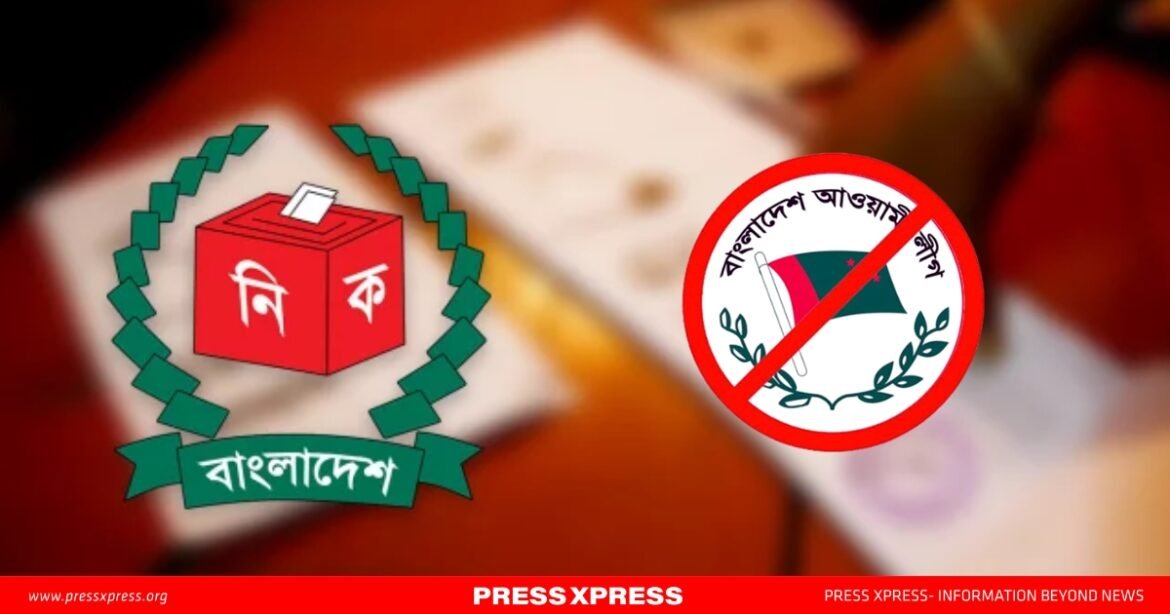Bangladesh’s fragile political transition now stands at a decisive crossroads. The suspension of the Awami League’s registration by the Election Commission—effectively barring the country’s largest political party from contesting the next election—has ignited a storm of debate at home and abroad. The Chief Adviser’s Government (CAG) insists that sweeping reforms and bans are necessary to cleanse the system. Opposition forces push for accelerated elections. And Islamist groups, long subdued, are again taking to the streets.
The question is unavoidable: can Bangladesh credibly chart a democratic transition without the Awami League, the nation’s largest secular party, on the ballot?
In mid-May 2025, the CAG invoked anti-terrorism and ICT provisions to ban Awami League activities, followed soon after by a suspension of the party’s registration. The Election Commission confirmed that, unless reinstated, the AL will remain ineligible to contest the polls.
Originally, elections were scheduled for April 2026. Recent signals, however, suggest that polls could be advanced to February 2026., leaving the country in limbo between two competing imperatives: reform first, or elections first.
- Bangladesh Awami League: A free, fair and participatory elections and restore of democracy.
- Bangladesh Nationalist Party (BNP): Demands polls as early as February 2026, under a neutral caretaker framework.
- National Citizen Party (NCP): A product of the student uprising, calling for deep reforms before elections and pressing hardest for AL’s exclusion.
- Jamaat-e-Islami: Has re-emerged with mass rallies for “fair elections,” signaling the return of Islamist mobilization.
- Chief Adviser’s Government (CAG): Frames the AL suspension as a necessary act of accountability but hints at a possible review after reforms.
- Gen. Waker-Uz-Zaman, Chief of Army Staff: Urges early elections but insists reforms must come first, warning of instability otherwise.
- Civil Society and Rights Groups: Warn that interim measures contradict the July Declaration, stressing that exclusionary politics risks delegitimizing the transition.
1. Electoral Legitimacy
Excluding the Awami League—a party that governed for 15 years and still commands vast grassroots support—undermines the credibility of the electoral process. Past experience shows that boycotts and low-turnout polls produce fragile mandates rather than genuine legitimacy.
2. Counter-Radicalization
With Jamaat visibly returning to the streets, sidelining the AL eliminates the largest secular counterweight to Islamist mobilization. The vacuum risks ceding the narrative, and possibly the streets, to extremist blocs.
3. Transition Economics
Investor confidence is already shaken by prolonged uncertainty. The IMF and World Bank have cautioned that “unsettled political fundamentals” carry heavy risks. A time-bound, inclusive election would restore stability more quickly than protracted bans and open-ended reform debates.
4. Process Over Personalities
The BNP demands speed. The NCP demands reform. The CAG seeks both. A phased approach—strict reforms, an enforceable electoral code, and guaranteed AL participation under international scrutiny—offers the least risky path forward.
Inclusion does not mean impunity. PressXpress analysis points to five safeguards that could balance accountability with participation:
- Independent Election Commission empowered to sanction violence, finance abuses, and hate speech.
- Observer Regime embedding international and domestic monitors from voter registration through results.
- Binding Code of Conduct signed by AL, BNP, NCP, and Jamaat, with enforceable penalties.
- Accountability–Amnesty Mix: Fast-track trials for major crimes, conditional amnesty for lesser offenses to prevent political witch-hunts.
- Time-Boxed Roadmap: 120 days for reforms, with elections immediately thereafter, aligning with the Chief of Army Staff’s “early but orderly” approach.
Transition Timeline (Aug 2024 – Aug 2025)
- Aug 2024: Student uprising leads to interim government.
- May 2025: AL activities banned.
- July 2025: AL registration suspended.
- Aug 2025: CAG and Reform Bloc hint at forward-shifted polls.
Stakeholder Demands vs. Risks
| Actor | Demand | Risk |
| BNP | Early polls | Boycott, renewed agitation |
| NCP | Deep reforms, exclude AL | Legitimacy gap |
| Jamaat | Return to elections | Islamist polarization |
| CAG | Ban + reforms first | Extended uncertainty |
| CAS | Early polls with reform | Instability if delayed |
What the Awami League Must Signal
For the AL to reposition itself in this fraught environment, it must signal three commitments:
- Democratic Discipline: Accept observer-heavy elections and binding conduct rules.
- Secular Stabilizer: Recast itself as the bulwark against Islamist resurgence.
- Economic Confidence: Emphasize its role in restoring investor stability and policy continuity.
- Youth Engagement: Launch a 10-point compact on jobs and skills aimed at the 18–29 demographic—both skeptical and decisive.
Bangladesh’s democratic reset cannot be built on exclusion. Banning the Awami League may satisfy reformist street movements in the short term, but it risks delegitimizing the transition, polarizing society, and undermining economic recovery.
Reform is essential. Accountability is necessary. But without inclusion, the process itself collapses under the weight of its contradictions.
As the PressXpress desk concludes: exclusion breeds fragility, while inclusion—with rules, oversight, and accountability—offers the only credible path to stability.


